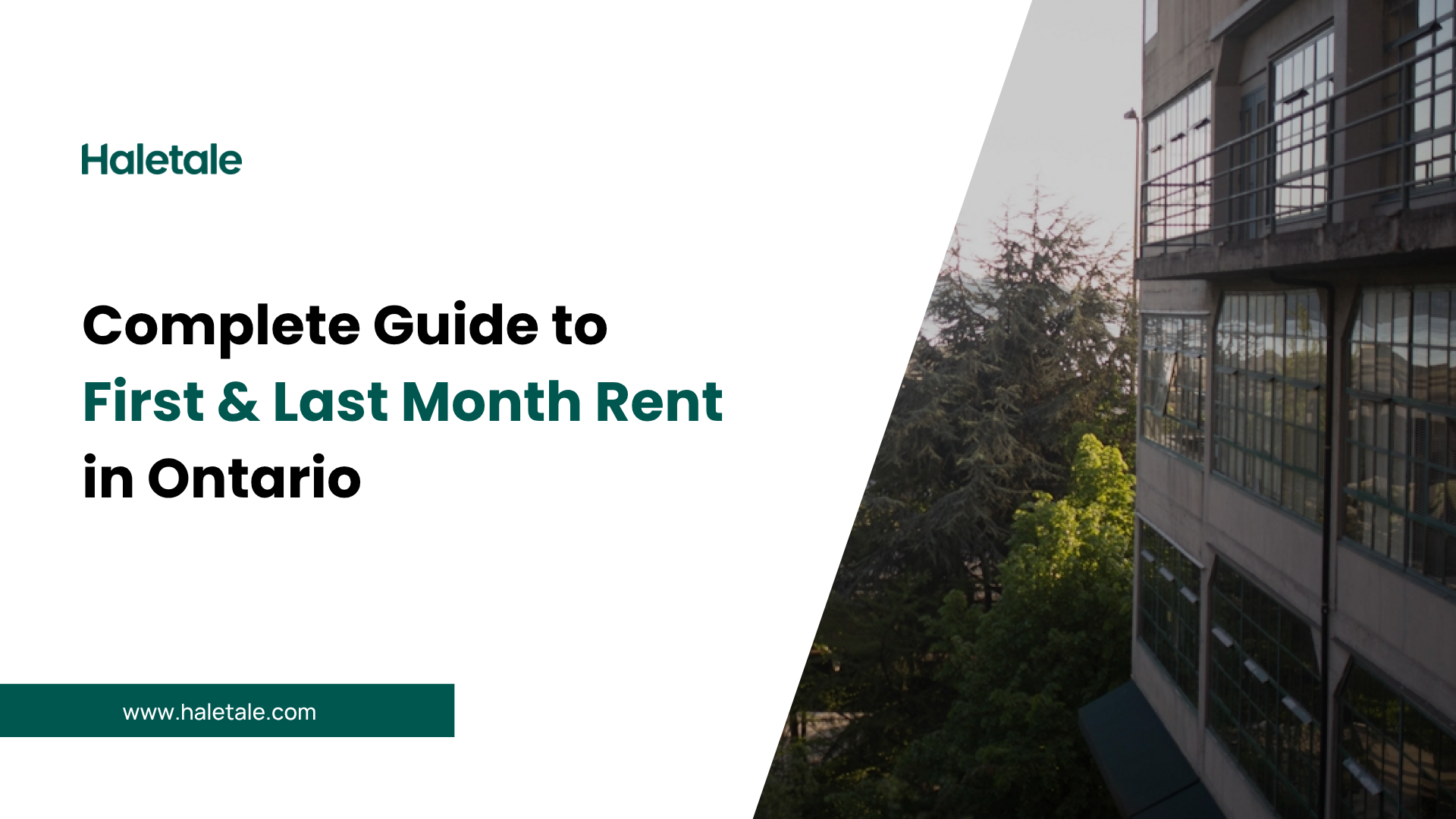The Complete Guide to First and Last Month Rent Rules in Ontario: Everything You Need to Know
Quick Summary
For Tenants: In Ontario, landlords can only collect a “last month’s rent deposit” equal to one month’s rent. This deposit covers your final month’s rent, earns annual interest at 2.5%, and cannot be used for damages. You must receive a receipt, and the deposit is applied to your last month of tenancy.
For Landlords: You can collect up to one month’s rent as a last month’s rent deposit. You must pay annual interest (currently 2.5%), provide a receipt, and use the deposit only for the tenant’s final month’s rent. Security deposits for damages are illegal in Ontario.
Key Rules: Only last month’s rent deposits are allowed (no damage deposits), interest must be paid annually, deposits apply to the final month regardless of lease termination timing, and all residential tenancies under the Residential Tenancies Act are covered.
When entering the Ontario rental market, both tenants and landlords encounter the concept of rent deposits—a crucial financial component that can significantly impact your rental experience. Understanding the intricacies of first and last month rent deposits is essential for navigating Ontario’s complex rental landscape successfully.
Understanding Rent Deposits: The Foundation
What Are Rent Deposits?
A rent deposit in Ontario is a sum of money that a landlord can legally require from a tenant before or upon moving into a rental property. Rent deposits, also called Last Month Rent (LMR) are taken to cover the rent payment for the last month’s rent of the tenancy only, nothing else. This deposit serves as a financial security measure for landlords while providing tenants with pre-paid rent for their final month of occupancy.
The Legal Framework
Under Ontario’s Residential Tenancies Act (RTA), rent deposits are strictly regulated to protect both parties’ interests. A rent deposit cannot be more than one month’s rent on a yearly or month-to-month rental, or one week’s rent on a weekly rental. This legal limitation ensures that tenants aren’t burdened with excessive upfront costs while still providing landlords with reasonable security.
Who is Involved in Rent Deposits?
Landlords: Rights and Responsibilities
Landlords in Ontario have specific rights regarding rent deposits. They can request a deposit equal to one month’s rent, but they must adhere to strict guidelines about its use and management. Landlords can only require a “last month’s rent deposit”—this covers your final month’s rent and must not be used for damages.
Key landlord responsibilities include:
- Providing a receipt for the deposit
- Paying annual interest on the deposit
- Using the deposit only for the tenant’s last month’s rent
- Returning unused portions if the tenant terminates early
Tenants: Rights and Protections
Tenants enjoy significant protections under Ontario law. Security deposits for damage are not allowed in Ontario residential tenancies. This means landlords cannot collect separate damage deposits or use rent deposits for anything other than the final month’s rent.
Tenant rights include:
- Receiving a receipt for their deposit
- Earning annual interest on their deposit
- Having the deposit applied to their last month’s rent
- Protection against misuse of their deposit funds
Legal Authorities and Support Systems
The Landlord and Tenant Board (LTB) oversees disputes related to rent deposits. Additionally, organizations like the Advocacy Centre for Tenants Ontario (ACTO) provide support and legal guidance for tenants navigating deposit issues.
What Constitutes a Legal Rent Deposit?
Last Month Rent Rules Ontario
Ontario law is very specific about what landlords can collect as deposits. The only permissible deposit is the last month’s rent deposit, which must be applied to the tenant’s final month of occupancy. Rent Deposit: An amount required by landlords equal to one month’s rent, either for the first or last month of the rental agreement.
Prohibited Deposits
Several types of deposits are explicitly forbidden in Ontario:
- Security deposits for potential damages
- Pet deposits (though pet rent may be allowed in some cases)
- Cleaning deposits
- Key deposits exceeding the actual cost of key replacement
Interest Requirements
One unique aspect of Ontario’s rent deposit system is the mandatory interest payment. A landlord is required to pay the tenant an interest on the rent deposit annually, that is, every 12 months. Under the Act, the interest rate is the same as the rent increase guideline, which helps protect tenants from inflation.
When Are Rent Deposits Required and Applied?
Timing of Collection
Rent deposits are typically collected before or upon moving into the rental property. The payment is made on moving or before moving into the rental property. This timing allows landlords to secure the tenancy while giving tenants time to arrange their finances.
Application of Deposits
The deposit must be applied to the tenant’s final month of rent, regardless of when the tenancy ends. Even in cases where a tenant breaks their lease early, the deposit should be applied to their last month of living at the rental. This rule protects tenants from losing their deposit due to early termination.
Annual Interest Payments
Tenants in Ontario are entitled to receive yearly interest on their last month’s rent deposit. This interest can be paid directly to the tenant or applied as a credit toward rent, providing additional financial benefit to tenants.
Where Do Rent Deposit Rules Apply?
Geographic Scope
Rent deposit regulations apply throughout Ontario, covering all residential tenancies governed by the Residential Tenancies Act. This includes apartments, houses, condominiums, and other residential rental properties across the province.
Property Types Covered
The rules apply to most residential rental properties, including:
- Standard apartment buildings
- Single-family homes
- Condominiums
- Townhouses
- Basement apartments
- Room rentals in shared accommodations
Exemptions
Certain properties may be exempt from standard RTA rules, such as:
- Commercial properties
- Some student housing
- Certain transitional housing arrangements
- Properties where the tenant shares kitchen or bathroom facilities with the landlord
Why Are Rent Deposits Important?
For Landlords
Rent deposits provide landlords with financial security and peace of mind. They ensure that landlords receive payment for the tenant’s final month, reducing the risk of rental income loss during tenant turnover. This is particularly important given the challenges landlords face in collecting rent from departing tenants.
For Tenants
From a tenant’s perspective, rent deposits serve as pre-paid rent for their final month of occupancy. Normally, in the case of a last month’s rent deposit, this sum is not returned to the tenant but rather is used as payment for the final month of their tenancy. This can help with budgeting and moving expenses.
Market Stability
The standardized approach to rent deposits helps create a more stable and predictable rental market. By limiting deposits to one month’s rent and prohibiting additional security deposits, Ontario’s system balances the needs of both landlords and tenants while preventing exploitation.
How Do Rent Deposits Work in Practice?
Collection Process
When a tenant applies for a rental property, the landlord may request a last month’s rent deposit. The process typically involves:
- Tenant submits rental application
- Landlord approves application and requests deposit
- Tenant provides deposit (usually by certified cheque or money order)
- Landlord provides receipt for deposit
- Tenancy agreement is signed
Documentation Requirements
The tenant is entitled to a receipt for the rent deposit. This receipt serves as proof of payment and should include:
- Amount paid
- Date of payment
- Property address
- Landlord’s name and contact information
- Clear statement that this is a last month’s rent deposit
Interest Calculation and Payment
The interest rate for rent deposits is tied to Ontario’s annual rent increase guideline. currently set at 2.5 percent, which is lower than the national average inflation rate of 3.1 percent. Landlords must calculate and pay this interest annually, either as a direct payment or rent credit.
Deposit Adjustments
When rent increases occur, landlords may need to collect additional funds to top up the deposit to match the new rent amount. However, this must be done carefully and in compliance with RTA requirements.
Common Scenarios and Solutions
Early Lease Termination
When tenants need to terminate their lease early, the deposit still applies to their last month of actual occupancy. The same goes for if a tenant pays a deposit and then changes their mind about signing the lease: the deposit money must still be returned to them.
Rent Increases and Deposit Adjustments
As rent increases over time, the original deposit may not cover the full amount of the final month’s rent. Landlords should distribute interest … to adjust the rent deposit to match the current rent. This ensures the deposit remains adequate while providing tenants with their rightful interest.
Dispute Resolution
When disputes arise over rent deposits, tenants and landlords can seek resolution through the Landlord and Tenant Board. Common issues include:
- Improper use of deposits for damages
- Failure to pay interest
- Disputes over deposit amounts
- Problems with deposit returns
Best Practices for Landlords
Proper Documentation
Maintain detailed records of all deposit transactions, including receipts, interest payments, and any communications with tenants about deposits. This documentation is crucial for resolving disputes and ensuring compliance with legal requirements.
Timely Interest Payments
Calculate and pay interest on deposits annually to avoid potential legal issues. Consider setting up automatic reminders to ensure timely payments.
Clear Communication
Explain deposit policies clearly to prospective tenants, including how the deposit will be used and when interest will be paid. This transparency helps prevent misunderstandings and builds trust.
Compliance Monitoring
Stay updated on changes to Ontario’s rental laws and regulations. The rules governing rent deposits can change, and landlords must ensure ongoing compliance.
Best Practices for Tenants
Know Your Rights
Understand your rights regarding rent deposits, including interest payments and proper usage. This knowledge helps you identify potential violations and protect your interests.
Keep Records
Maintain copies of all deposit-related documents, including receipts, interest payments, and correspondence with your landlord. These records are valuable for dispute resolution.
Monitor Interest Payments
Track whether your landlord is paying the required annual interest on your deposit. If payments are missed, address the issue promptly.
Understand Deposit Application
Remember that your deposit will be applied to your final month’s rent, not returned as cash. Plan your moving budget accordingly.
Future Considerations and Trends
Potential Regulatory Changes
Ontario’s rental market continues to evolve, and deposit rules may change in response to market conditions and policy developments. Stay informed about potential changes that could affect your rights and responsibilities.
Technology Integration
Digital payment systems and property management software are making deposit management more efficient and transparent. These tools can help both landlords and tenants track deposits and interest payments more effectively.
Market Pressures
As Ontario’s rental market faces increasing pressure from demand and affordability challenges, deposit rules may come under scrutiny. Understanding current regulations helps stakeholders adapt to potential changes.
Conclusion
Rent deposits in Ontario represent a carefully balanced system designed to protect both landlords and tenants while maintaining market stability. Landlords should still be withholding the tenant’s last month deposit for whichever month precedes their move-out/termination date. This principle underscores the importance of proper deposit management throughout the tenancy.
Whether you’re a first-time tenant navigating the rental market or an experienced landlord managing multiple properties, understanding the who, what, when, where, why, and how of rent deposits is essential for success. By following the guidelines outlined in this comprehensive guide, you can ensure compliance with Ontario’s rental laws while protecting your interests and maintaining positive landlord-tenant relationships.
The key to successful rent deposit management lies in understanding the legal framework, maintaining proper documentation, and communicating clearly with all parties involved. As Ontario’s rental market continues to evolve, staying informed about deposit regulations and best practices will help you navigate this complex landscape with confidence and success.
Remember that while this guide provides comprehensive information about rent deposits in Ontario, specific situations may require professional legal advice. When in doubt, consult with qualified legal professionals or contact the Landlord and Tenant Board for guidance on your particular circumstances.
Frequently Asked Questions (FAQ)
General Questions
Q: What’s the difference between a security deposit and a last month’s rent deposit in Ontario? A: In Ontario, security deposits for damages are illegal. Landlords can only collect a “last month’s rent deposit” equal to one month’s rent, which must be used exclusively for the tenant’s final month of rent, not for damages or other costs.
Q: How much can a landlord charge for a rent deposit? A: Maximum one month’s rent for monthly or yearly tenancies, or one week’s rent for weekly tenancies. This is the legal limit under the Residential Tenancies Act.
Q: Can landlords charge additional deposits for pets, keys, or cleaning? A: No. The only legal deposit is the last month’s rent deposit. Pet deposits, key deposits (beyond actual replacement cost), and cleaning deposits are prohibited.
Interest and Payments
Q: Do I earn interest on my rent deposit? A: Yes. Landlords must pay annual interest on rent deposits at the same rate as Ontario’s rent increase guideline (currently 2.5%). Interest can be paid directly or applied as a rent credit.
Q: When should I receive interest payments? A: Interest must be paid annually, every 12 months from the date you paid the deposit. Many landlords pay on the anniversary date of the deposit or apply it as a rent credit.
Q: What happens if my landlord doesn’t pay interest on my deposit? A: You can file a complaint with the Landlord and Tenant Board. Keep records of your deposit payment and any missed interest payments as evidence.
Deposit Usage and Return
Q: Will I get my deposit back when I move out? A: No, the deposit isn’t returned as cash. It’s applied to your final month’s rent, regardless of when you move out. If you terminate early, it covers your last month of actual occupancy.
Q: Can my landlord use my deposit to pay for damages? A: Absolutely not. The deposit can only be used for your final month’s rent. Landlords cannot use it for damages, unpaid rent from other months, or any other costs.
Q: What if my rent has increased since I paid the deposit? A: If your current rent is higher than your original deposit, you may need to pay the difference for your final month. The annual interest payments help offset some of this increase.
Documentation and Records
Q: Should I get a receipt for my deposit? A: Yes, you’re entitled to a receipt. The receipt should include the amount, date, property address, landlord’s information, and clearly state it’s a last month’s rent deposit.
Q: What records should I keep? A: Keep your deposit receipt, records of interest payments, any correspondence about the deposit, and your lease agreement. These documents are crucial for dispute resolution.
Special Situations
Q: What happens to my deposit if I break my lease early? A: The deposit still applies to your final month of actual occupancy. Even if you terminate early, the deposit covers your last month of living at the property.
Q: Can a landlord increase my deposit amount? A: Generally no, but they may request additional funds to top up the deposit if rent increases significantly and the original deposit plus accumulated interest doesn’t cover a full month’s rent.
Q: I paid a deposit but decided not to sign the lease. Can I get it back? A: Yes, if you paid a deposit but didn’t sign the lease or take occupancy, the deposit should be returned to you.
Dispute Resolution
Q: Where can I get help with deposit disputes? A: Contact the Landlord and Tenant Board (LTB) for formal dispute resolution. Organizations like the Advocacy Centre for Tenants Ontario (ACTO) also provide guidance and support.
Q: How long do I have to file a complaint about my deposit? A: Generally, you have one year from when you knew or should have known about the issue. However, it’s best to address deposit problems as soon as they arise.
Q: What evidence do I need for a deposit dispute? A: Gather your deposit receipt, lease agreement, records of rent payments, correspondence with your landlord, and any documentation of interest payments or lack thereof.
For Landlords
Q: When can I collect a rent deposit? A: You can request a last month’s rent deposit when a tenant applies for the property, but typically it’s collected before or upon move-in. You cannot make tenancy conditional on paying additional illegal deposits.
Q: How do I calculate interest on deposits? A: Use Ontario’s annual rent increase guideline rate (currently 2.5%). Calculate from the deposit date and pay annually. The interest compounds if not paid annually.
Q: What if a tenant damages the property? A: You cannot use the rent deposit for damages. You must pursue damages through the Landlord and Tenant Board or small claims court separately from the deposit.
Q: Can I hold the deposit in my personal account? A: While there’s no specific requirement for a separate account, you must ensure the deposit is available when needed and pay the required interest. Many landlords use separate accounts for better record-keeping.
Legal and Compliance
Q: Are there any exemptions to these deposit rules? A: Most residential tenancies under the RTA are covered. Some exemptions include commercial properties, certain student housing, and situations where tenants share kitchen/bathroom facilities with the landlord.
Q: What are the penalties for landlords who violate deposit rules? A: The Landlord and Tenant Board can order repayment of illegal deposits, interest payments, and potentially additional compensation. Violations can also impact future LTB proceedings.
Q: Where can I find the most current deposit rules? A: Check Ontario.ca for the most current Residential Tenancies Act and contact the Landlord and Tenant Board for specific guidance. Rules and interest rates can change annually.









